最经典最清晰虚拟语气讲解
(完整版)英语虚拟语气语法归纳总结
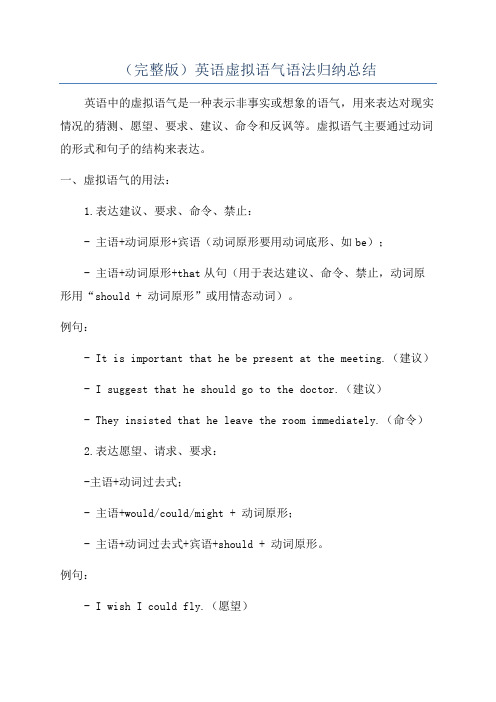
(完整版)英语虚拟语气语法归纳总结英语中的虚拟语气是一种表示非事实或想象的语气,用来表达对现实情况的猜测、愿望、要求、建议、命令和反讽等。
虚拟语气主要通过动词的形式和句子的结构来表达。
一、虚拟语气的用法:1.表达建议、要求、命令、禁止:- 主语+动词原形+宾语(动词原形要用动词底形、如be);- 主语+动词原形+that从句(用于表达建议、命令、禁止,动词原形用“should + 动词原形”或用情态动词)。
例句:- It is important that he be present at the meeting.(建议)- I suggest that he should go to the doctor.(建议)- They insisted that he leave the room immediately.(命令)2.表达愿望、请求、要求:-主语+动词过去式;- 主语+would/could/might + 动词原形;- 主语+动词过去式+宾语+should + 动词原形。
例句:- I wish I could fly.(愿望)- I would appreciate it if you could help me.(请求)3.表示虚拟条件:- If条件从句中的谓语动词用过去完成时,主句用would/should/might/could + have + 过去分词;- If条件从句中的谓语动词用过去时,主句用would/should/could + 动词原形。
例句:- If I had known his phone number, I would have called him.(虚拟条件)- If you had listened to me, we could have finished the project earlier.(虚拟条件)4.表达建议、要求、祝愿:- If only内部称述 + 主语 + 过去式。
高中英语2025届高考语法复习虚拟语气知识讲解

高考英语语法复习虚拟语气知识讲解一、基础知识(一)什么是虚拟语气谓语动词的作用不仅可以表示动作的时间、状态、假设(情感),也是一种语气(mood)的表现形式,表明说话的目的和意图。
(语气包含陈述语气、祈使语气、虚拟语气、疑问语气)虚拟语气用于表示假设、愿望、建议、命令等非真实或虚拟的情况,即与真实相反。
上学的时候老师经常举的一个例子,"If I were you"因为我不可能是你,这是一种不可能存在的事实,所以这是个虚拟语句。
总而言之英语中的虚拟语气可以分为两大体系:一是表示与事实相反的,或者是假象的情形,通常由if引导,叫做虚拟条件句;另一个体系是在名词从句中使用虚拟语气,表示建议,命令或者要求等语气,类似于上述美剧常用的台词。
(二)虚拟语气的用法这一部分我们主要用虚拟语气在条件句中的用法作为讲解与现在事实相反:If I had a map, I would lend it to you.如果我有地图我就借给你。
(但我没有)与将来事实相反:If I were to do the job, I would do it in a different way. 要是我来做这工作,我会是另一种做法。
(言外之意不是我做这个工作,用虚拟表达是我做这份工作的可能性很低)与过去事实相反:If anything had happened, he would have let us know.如果发生了什么情况,他早就通知我们了。
(所以没事发生)它们的共性都是表示与事实相反或者实现可能性不大3.特殊情况①在极少情况下,从句的谓语动词用原形,主句的谓语动词可用陈述语气(比较官方,正式,大气的说法,口语很少使用)If that be the official view, it cannot be accepted.如果这是官方的看法,这是不能接受的。
②if可以省略,但是语序要改为倒装Were I Tom I would refuse.如果我是汤姆我会拒绝。
(完整版)虚拟语气详解

虚拟语气详解虚拟语气表示说话人的主观愿望(往往与客观事实相反),或是表示假象和猜测。
虚拟语气无论从形式上还是时态上都比较复杂,需要归类记忆。
虚拟语气大体分为三类:(1) be型虚拟(2) were型虚拟(3) if 条件句及主句虚拟下面会详细说每种虚拟形式的特征和规律,考试时先判断属于哪种虚拟类型,剩下的皆是套路~(1)be型虚拟(基本是套路)形式:should + 动词原形,should可以省略用法:1)表示“命令、建议、要求”等意义词语之后的宾语从句用be型虚拟,常见的词如下: demand, desire, insist, order, ask, command, propose, recommend, suggest, prefer, require, request等最常见的形式是这类动词后面接着一个宾语从句,则宾语从句的谓语部分要用(should)+ 动词原形来虚拟例: We demand that the meeting(should)be postponed.The manager suggested that we (should) work together.注意:有时候你所见到不一定是上述动词引导的宾语从句,而是由上述词变体后所引导主语从句(it做形式主语,如:it is advised/ suggested/ requested/ ordered/ proposed that…)、表语从句或同位语从句例如:It is required that the students (should) learn a foreign language. (主语从句) The requirement is that all the equipment in the meeting room (should) be checked twice before. (表语从句)We didn’t stand for his proposal that the meeting (should)be postponed. (同位语从句)只要看到句中有上述动词或其变体,不管词性怎么变、句型怎么变,都用be型虚拟!特例:suggest和insist这两个比较特殊,当suggest作“暗示、表明、说明”讲,insist作“坚持说”讲,后面一般跟的是客观事实,不需要虚拟~这是一个比较重要的考点,体会下面两组句子:We all suggest that a lab (should) be built. 我们都建议建一个实验室。
高中英语之虚拟语气详细讲解
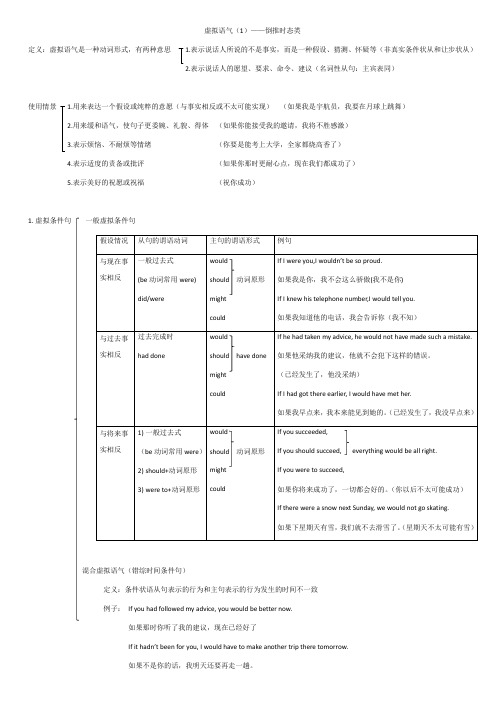
虚拟语气(1)——倒推时态类定义:虚拟语气是一种动词形式,有两种意思 1.表示说话人所说的不是事实,而是一种假设、猜测、怀疑等(非真实条件状从和让步状从)2.表示说话人的愿望、要求、命令、建议(名词性从句:主宾表同)使用情景 1.用来表达一个假设或纯粹的意愿(与事实相反或不太可能实现)(如果我是宇航员,我要在月球上跳舞)2.用来缓和语气,使句子更委婉、礼貌、得体(如果你能接受我的邀请,我将不胜感激)3.表示烦恼、不耐烦等情绪(你要是能考上大学,全家都烧高香了)4.表示适度的责备或批评(如果你那时更耐心点,现在我们都成功了)5.表示美好的祝愿或祝福(祝你成功)1.虚拟条件句一般虚拟条件句混合虚拟语气(错综时间条件句)定义:条件状语从句表示的行为和主句表示的行为发生的时间不一致例子:If you had followed my advice, you would be better now.如果那时你听了我的建议,现在已经好了If it hadn’t been for you, I would have to make another trip there tomorrow.如果不是你的话,我明天还要再走一趟。
If you had studied hard before,you would be a college student now.如果你以前努力学习的话,你现在就是大学生了。
省略+倒装当虚拟条件句的谓语动词中含有were,should,had时,if可以省略,并将were,should,had提前于句首,变为倒装句。
如果虚拟条件句是否定句,not 保留在原处If he should agree to go there, we should send him there.= Should he agree to go there,we should send him there.If she were there,she would agree with us.= Were she were, she would agree with us.If he had learnt about computers,we would have hired him.= Had he learnt about computers,we would have hired him.含蓄虚拟条件句定义:有时为了表达的需要,在虚拟语气中并不总是出现if引导的条件状语从句,而是通过其他手段来代替条件从句分类:1) but for....=(If it+be not for) ;without;Without your help ,we couldn’t have finished the work ahead of time.= But for your help,we couldn’t have finished the work ahead of time.= If it hadn’t been for your help,we couldn’t have finished the work ahead of time.没有你的帮助,我们不可能完成任务。
高中必备知识点解析虚拟语气的形式与用法

高中必备知识点解析虚拟语气的形式与用法虚拟语气是高中英语必备的语法知识点之一。
它在英语中经常被用于表达假设、愿望、建议、命令和推测等情态,通过使用虚拟语气,可以使语言更加丰富和准确。
本文将深入解析虚拟语气的形式与用法。
一、虚拟语气的形式1. 虚拟语气的一般现在时:用于表示与现在事实相反的情况。
其结构为:主语+动词原形(倒装)。
例如:If I were you, I would study harder.(如果我是你,我会更加努力学习。
)2. 虚拟语气的一般过去时:用于表示与过去事实相反的情况。
其结构为:主语+动词过去式(倒装)。
例如:If I had seen her yesterday, I would have said hello.(如果我昨天见到她,我会问好的。
)3. 虚拟语气的过去完成时:用于表示对过去情况的猜测或不可能发生的情况。
其结构为:主语+动词过去完成式(倒装)。
例如:I wish I had studied harder for the exam.(我希望我为考试努力学习。
)二、虚拟语气的用法1. 表达假设与条件:If I were you, I would travel around the world.(如果我是你,我会环游世界。
)I wish I had a million dollars.(我希望我有一百万美元。
)2. 表达愿望与建议:I wish you would stop smoking.(我希望你戒烟。
)It's important that she arrive on time.(她按时到达很重要。
)3. 表达命令与要求:The teacher ordered that the students be quiet.(老师要求学生们保持安静。
)She insisted that he leave immediately.(她坚持要他立刻离开。
)4. 表达推测与猜测:He looks as if he were sick.(他看起来像是生病了。
最经典最清晰虚拟语气讲解
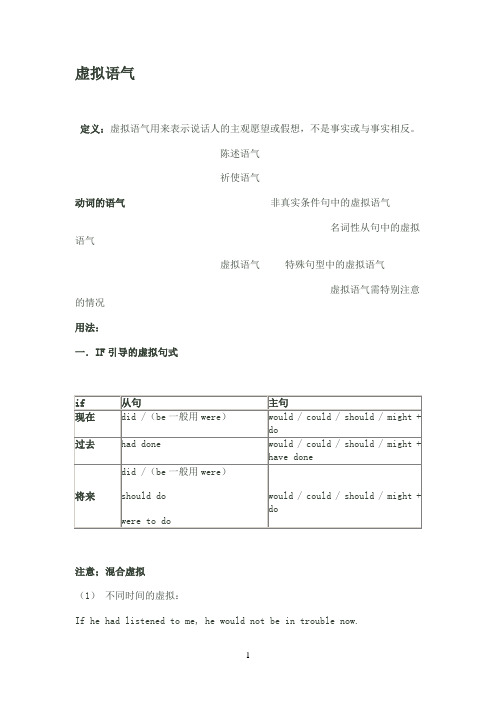
虚拟语气定义:虚拟语气用来表示说话人的主观愿望或假想,不是事实或与事实相反。
陈述语气祈使语气动词的语气非真实条件句中的虚拟语气名词性从句中的虚拟语气虚拟语气特殊句型中的虚拟语气虚拟语气需特别注意的情况用法:一.IF引导的虚拟句式注意;混合虚拟(1)不同时间的虚拟:If he had listened to me, he would not be in trouble now.If he had told me yesterday, I should know what to do now.(2) 虚拟与陈述的混合:He could have passed the exam, but he wasn’t careful enough. You should have come earlier, the bus left a moment ago.二.名词性从句中的虚拟语气:从句谓语动词(should) +do1.主语从句:it is + adj + that结构2.宾语从句:主语+要求接虚拟语气的动词+that一个坚持:insist两个命令:order; command 两个决定:decide; determine三个建议:suggest; advise; propose四个要求:demand; ask; request; require注意:① suggest:暗示;insist:坚持说(不虚拟)② except, believe, think suspect等动词的否定形式或疑问句后面的宾语从句要用虚拟。
I never thought that he should be such a brave young solider③ should竟然I am glad that your novel should have won the first prize.④ wish引导从句的虚拟语气,谓语动词变化和if从句虚拟语气一样。
非常详细的虚拟语气讲解资料

虚拟语气第一部分:语气的定义和种类1 语气(mood)语气是动词的一种形式,表示说话人对某一行为或事情的看法和态度。
2 语气的种类⑴、陈述语气:表示动作或状态是现实的、确定的或符合事实的,用于陈述句、疑问句和某些感叹句。
如:①There are two sides to every question.每个问题都有两个方面。
②Were you busy all day yesterday?昨天一整天你都很忙吗?③How good a teacher she is!她是多好的一位老师啊!⑵、祈使语气:表示说话人对对方的请求或命令。
如:①Never be late again!再也不要迟到了。
②Don’t forget to turn off the light.别忘了关灯。
⑶、虚拟语气:表示动作或状态不是客观存在的事实,而是说话人的主观愿望、假设或推测等。
如:①If I were a bird, I could fly in the air.如果我是一只小鸟,我就能在空中飞行。
②I wish I could pass the examination.我希望我能通过考试。
③May you succeed!祝您成功!虚拟语气在语法里算得上是个难点。
让我们就从最简单的开始吧。
第二部分:简单句中的虚拟语气一、情态动词的过去式用于现在时态时,表示说话人的谦虚、客气、有礼貌、或委婉的语气,常用于日常会话中。
如:⑴.Would you be kind enough to show me the way to the post office?请你告诉我去邮局的路好吗?⑵.It would be better for you not to stay up too late.你最好别熬夜到很晚。
二、表祝愿。
1、常用“may+动词原形”表示祝愿,但愿,此时may须置于句首(多用于正式文体中)。
⑴、May good luck be yours!祝你好运!⑵、May you be happy!祝你快乐!⑶、May you do even better!祝你取得更大成就!⑷、May you have a good time. 祝愿你玩的痛快。
虚拟语气讲解以及练习
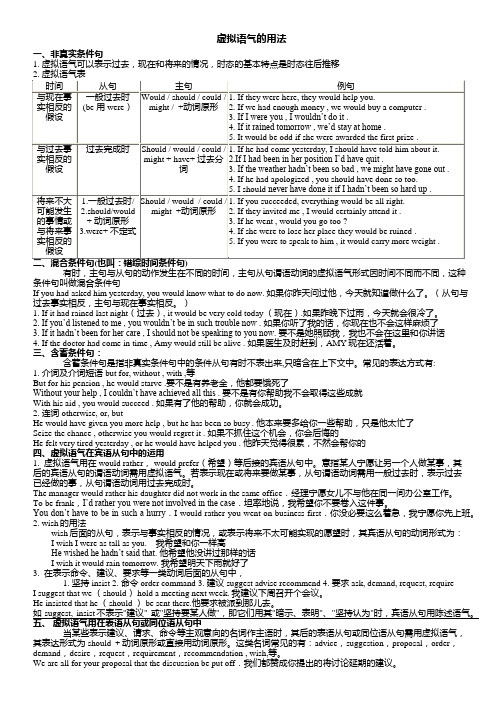
虚拟语气的用法一、非真实条件句1. 虚拟语气可以表示过去,现在和将来的情况,时态的基本特点是时态往后推移有时,主句与从句的动作发生在不同的时间,主句从句谓语动词的虚拟语气形式因时间不同而不同,这种条件句叫做混合条件句If you had asked him yesterday, you would know what to do now. 如果你昨天问过他,今天就知道做什么了。
(从句与过去事实相反,主句与现在事实相反。
)1. If it had rained last night(过去), it would be very cold today (现在).如果昨晚下过雨,今天就会很冷了。
2. If you’d listened to me , you wouldn’t be in such trouble now . 如果你听了我的话,你现在也不会这样麻烦了3. If it hadn’t been for her care , I should not be speaking to you now. 要不是她照顾我,我也不会在这里和你讲话4. If the doctor had come in time , Amy would still be alive . 如果医生及时赶到,AMY现在还活着。
三、含蓄条件句:含蓄条件句是指非真实条件句中的条件从句有时不表出来,只暗含在上下文中。
常见的表达方式有:1. 介词及介词短语 but for, without , with ,等But for his pension , he would starve .要不是有养老金,他都要饿死了Without your help , I couldn’t have achieved all this . 要不是有你帮助我不会取得这些成就With his aid , you would succeed . 如果有了他的帮助,你就会成功。
虚拟语气超详细讲解
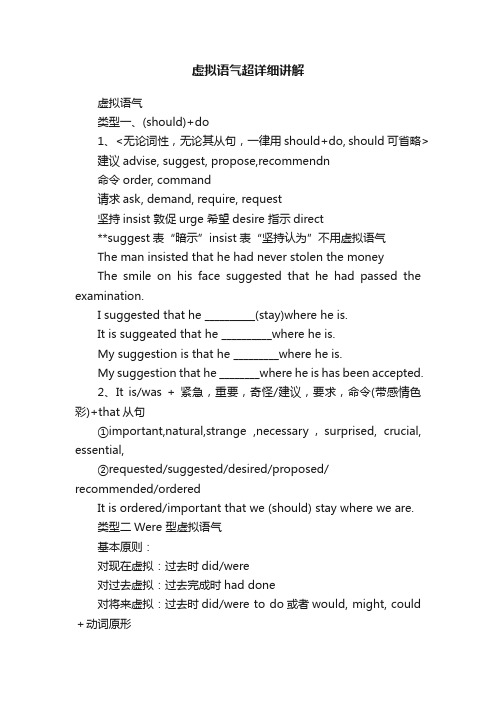
虚拟语气超详细讲解虚拟语气类型一、(should)+do1、<无论词性,无论其从句,一律用should+do, should可省略>建议advise, suggest, propose,recommendn命令order, command请求ask, demand, require, request坚持insist 敦促urge 希望desire 指示direct**suggest表“暗示”insist表“坚持认为”不用虚拟语气The man insisted that he had never stolen the moneyThe smile on his face suggested that he had passed the examination.I suggested that he __________(stay)where he is.It is suggeated that he __________where he is.My suggestion is that he _________where he is.My suggestion that he ________where he is has been accepted.2、It is/was + 紧急,重要,奇怪/建议,要求,命令(带感情色彩)+that从句①important,natural,strange ,necessary,surprised, crucial, essential,②requested/suggested/desired/pro posed/ recommended/orderedIt is ordered/important that we (should) stay where we are.类型二Were 型虚拟语气基本原则:对现在虚拟:过去时did/were对过去虚拟:过去完成时had done对将来虚拟:过去时did/were to do或者would, might, could +动词原形1. if 条件句中的虚拟时间从句谓语形式主句谓语形式将来动词过去式(be用were)should + 动词原形were to + 动词原形would / should / might / could + 动词原形现在动词过去式(be 用were) would / should / might / could + 动词原形过去had +动词过去分词would / should / might / could have + 动词过去分词1.1 与现在事实不一致,其句型为:If +主语+did ,主语+should (could, would, 或might )+do .If I were you, I would study hard. (可倒装)If it rained, I would not be here now.1.2 与过去事实不一致,句型为:If +主语+had +done ,主语+should (could, would, 或might )+have +done. If the doctor had come last night, the boy would have been saved. (可倒装)1.3 将来事实不一致,句型为:If should were to 主语++do ,主语+should (could ,would, 或might )+do. If it should rain tomorrow, we would stay at home.(可倒装)If I were to go to the moon one day, I could see it with my own eyes.(可倒装) If you missed the film to night, you would feel sorry.(混合虚拟)难点:①在条件句中如果出现were, had, should 可省去if ,将主语与这些词倒装 Had the doctor come last night , the boy would havesaved.Were I to go to the moon one day , I would see it with my own eyes.Should it rain tomorrow , we would stay at home.②当条件状语从句表示的行为和主句表示的行为所发生的时间不一致时,被称为“错综时间条件句”,常常表现为if+过去虚拟+主句现在虚拟If you had followed my advice, you would be better now.If you had studied hard before, you would be a college student now.2. wish 后面的宾语从句中与现在愿望不一致: 主语+did ; I wish I were you.与过去愿望不一致: 主语+had +done ;I wish I had visited the white House when I was in the states.与未来愿望不一致: 主语+would (could )+do 。
高考英语语法:虚拟语气讲义

虚拟语气虚拟语气表示动作或状态与事实相反,或不可能发生的情况。
一、虚拟语气用于条件状语从句中从句主句与现实事实相反一般过去式(be--were)Should/would/could/might + V原与过去事实相反Had + done Should/would/could/might +have done与将来事实相反过去式;should+V 原;were to + V原Should/would/could/might + V原1. 表示与现在事实相反或不可能发生:条件状语从句:一般过去时(虚拟语气中be→were)主句用:would(should, could, might)+动词原形。
If we had time now, we would read it again.If I were you, I would work hard.2. 表示与过去事实相反或不可能发生:条件状语从句:had+过去分词;主句:would(should, could, might)+have+过去分词。
If he had taken my advice, he would have succeeded in the test.If I had known your telephone number then, I would have called you.3. 表示与将来的事实可能相反或不可能发生:条件状语从句:①一般过去时②should +动词原形③were to+动词原形;主句:would(should, could, might)+动词原形。
If it should rain, the crops would be saved.If it were to snow tomorrow, they would not go out.例句:If there were no subjunctive mood, English ( ) much easier to learn. (B)A. could have beenB. would beC. will beD. would have been(2)省略if的虚拟语气如果从句中含有were/ should/ had时,则可以把这三个词置于句首,省略if.采用倒装语序。
虚拟语气的用法和常见句型
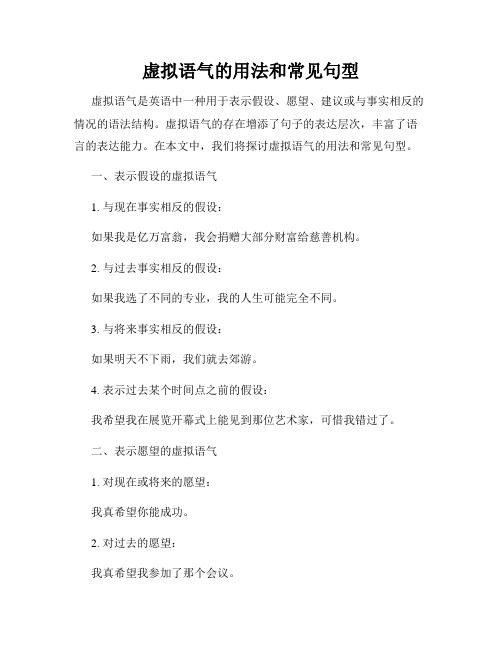
虚拟语气的用法和常见句型虚拟语气是英语中一种用于表示假设、愿望、建议或与事实相反的情况的语法结构。
虚拟语气的存在增添了句子的表达层次,丰富了语言的表达能力。
在本文中,我们将探讨虚拟语气的用法和常见句型。
一、表示假设的虚拟语气1. 与现在事实相反的假设:如果我是亿万富翁,我会捐赠大部分财富给慈善机构。
2. 与过去事实相反的假设:如果我选了不同的专业,我的人生可能完全不同。
3. 与将来事实相反的假设:如果明天不下雨,我们就去郊游。
4. 表示过去某个时间点之前的假设:我希望我在展览开幕式上能见到那位艺术家,可惜我错过了。
二、表示愿望的虚拟语气1. 对现在或将来的愿望:我真希望你能成功。
2. 对过去的愿望:我真希望我参加了那个会议。
三、表示建议的虚拟语气1. 建议:他建议我尽早去见医生。
2. 要求:老师要求我们每天完成作业。
四、常见的虚拟语气句型1. If only... (要是...该多好)If only I were younger, I could join the marathon.(要是我年轻些就好了,我就可以参加马拉松了。
)2. It's time... (是时候...了)It's time we started planning for our summer vacation.(是时候我们开始为暑假计划了。
)3. I wish... (我希望...)I wish I had more time to spend with my family.(我希望我有更多时间陪伴家人。
)4. Suppose... (假设...)Suppose it rains tomorrow, what should we do?(假设明天下雨了,我们该怎么办?)5. If it were not for... (要不是因为...)If it were not for your help, I wouldn't have finished the project on time.(要不是因为你的帮助,我不会按时完成这个项目。
虚拟语气最全精讲

killed. (如果不是我警告你, 你早已经被杀了)
21
虚拟语气用于从句
1)在主语+ suggest , demand, insist, order,propose ( 建议), request, require, advise等+ 宾语从句,表示建议 、要求、命令等意义的动词时,宾语从句中应使用虚拟 语气(用 should + 动词原形,should 常常省略)。
15
2、主从句都与过去相反
① If he had known your address yesterday, he might have telephoned you. 如果他昨天知道你的地址,他就会给你打电话。 (事实:他不知道) ② If he had taken my advice, he would not have
19
虚拟语气的特殊情况用法
注:2)如果虚拟语气条件句中不使用if,则需要将 条件句中的主谓倒装,为虚拟语气的倒装。
其表现形式为:把if 去掉,将were, had, should 提到从句的句首。
Were I as strong as you, I would run as fast as you. (=If I were as strong as you …) 如果我像你一样壮,我会跑的得跟你一样快。
20
虚拟语气的特殊情况用法
IF I were you, I wouldn’t feel sorry. Were I you, I wouldn’t feel sorry. 若条件从句中的谓语动词为否定式,只能将否定词
虚拟语气讲解(整理)

(3)虚拟语气在 在主语从句中
A.在句型 “It is important (necessary, strange, natural) that .... ” 中,that 后面的从句中的谓语动词 用: should + 动词原形
1. 我们有必要出去散散步。 It’s necessary that we should have a walk now.
2.用于表示命令、建议、要求等一类词后面的宾语从句。 insist, order, command, suggest, advise, propose, require, request, demand, desire etc.
We suggested that the meeting (should) be put off.
7. It is of the utmost importance that you ______ here on time. a. be b. shall be c. are to be d. must be
三、虚拟语气在其他从句中
1. It is (high / about ) time that…从句中的谓 语动词用过去式或should+动词原形,should 不能省略. It is high time that you went / should go to school.
I would rather you told me the truth. I would rather you had gone there last Sunday.
4. as if ( as though) 看起来 常用虚拟形式,即 表示与现在事实相反,用过去式;与过去事实相反 用过去完成式 (had done).
英语虚拟语气知识点总结

英语虚拟语气知识点总结一、虚拟语气的概念:虚拟语气,是指表示说话者所说的情况并非现实或已经发生,或在说话时还不确定是否实现的一种语态。
其特点是句子中的动词形式属于虚拟语气。
二、虚拟语气的表达:1. 条件虚拟语气:表示与现在或未来事实相反的虚拟情况。
(1)主句用过去时,从句用过去完成时。
If I had known the truth, I would not have believed him.(如果我知道了真相,我就不会相信他了。
)(2)主句用过去式,从句用“had+过去分词”。
If he had worked harder, he would have passed the exam.(如果他更加努力学习的话,他就能够通过这个考试。
)2. 虚拟假设语气:表示想像中与现在或将来相反的事情。
(1)主句用过去时,从句用过去式。
If I knew his address, I would go there and see him now.(如果我知道他的地址的话,我现在就会去找他了。
)(2)主句用were,表示与过去的虚拟情况相反。
If I were you, I would study hard.(如果我是你的话,我会好好学习。
)3. 祝愿虚拟语气:表示转化为现实的愿望。
(1)主句用过去式,从句用过去完成式。
I wish I had known him earlier.(我希望我更早认识他。
)(2)主句用过去式,从句用would / could +动词原形。
I wish he could help me with my English.(我希望他能够帮助我学习英语。
)4. 建议虚拟语气:表示对假设的结果的建议。
If I were you, I would work harder.(如果我是你的话,我会更加努力工作。
)5. 明确表示否定的虚拟语气:If they didn’t arrive on time, they would miss the plane.(如果他们没按时到达,他们将会错过飞机。
初中英语语法知识总结之虚拟语气

初中英语语法知识总结之虚拟语气虚拟语气是英语中的一种特殊语气,用于表示与事实相反的假设、愿望、建议、命令等。
在初中英语中,虚拟语气是一个重要的语法知识点,掌握好虚拟语气的用法可以帮助我们更准确地表达自己的意思。
下面是对初中英语虚拟语气的相关知识总结。
一、虚拟语气的用法1.与现在事实相反的虚拟语气(与现在事实相反的假设)表示对现在情况的否定、假设或建议。
a) 与现在动作情况相反:If I were you, I would study harder.(如果我是你,我会更加努力学习。
)注意:“were”在这里被用作“was”的虚拟形式,表示与现在事实相反的假设。
b) 与现在实际情况相反:I wish I had more time.(我希望我有更多时间。
)注意:“I wish”后跟的是“had”,表示现在我没有更多时间的愿望。
2.与过去事实相反的虚拟语气(与过去事实相反的假设)表示对过去情况的否定、假设或建议。
a) 与过去动作情况相反:If I had studied harder, I would have passed the exam.(如果我当初学得更努力,我就能通过这次考试了。
)b) 与过去实际情况相反:I wish I had listened to my parents.(我希望我当初听了我的父母的话。
)3.与将来事实相反的虚拟语气(与将来事实相反的假设)表示对将来情况的否定、假设或建议。
a) 表示对将来情况的不可能性:If it were to rain tomorrow, we would cancel the picnic. (如果明天下雨,我们就会取消野餐计划。
)b) 表示对将来情况的愿望:I hope I will pass the exam. (我希望我能通过考试。
)二、虚拟语气的常见句型1. If only + 过去式表示很遗憾没有实现过去的愿望。
例如:If only I had listened to my teacher's advice, I would not have made such a mistake.(要是我当初听从了老师的建议,就不会犯这样的错误了。
虚拟语气详细讲解及经典习题 附答案
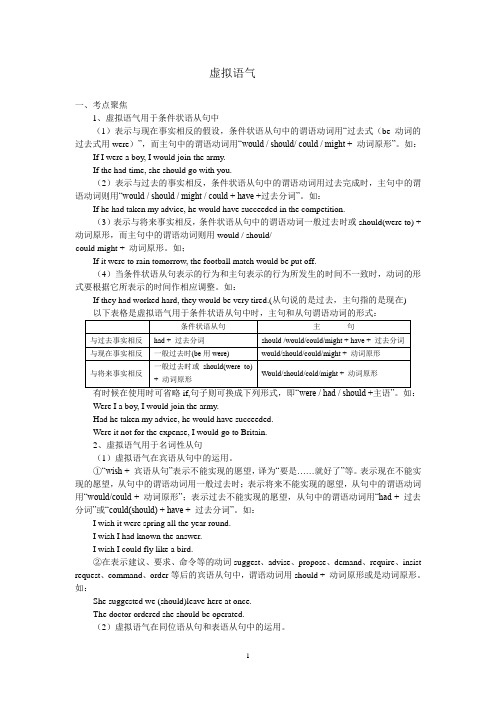
虚拟语气一、考点聚焦1、虚拟语气用于条件状语从句中(1)表示与现在事实相反的假设,条件状语从句中的谓语动词用“过去式(be动词的过去式用were)”,而主句中的谓语动词用“would / should/ could / might + 动词原形”。
如:If I were a boy, I would join the army.If the had time, she should go with you.(2)表示与过去的事实相反,条件状语从句中的谓语动词用过去完成时,主句中的谓语动词则用“would / should / might / could + have +过去分词”。
如:If he had taken my advice, he would have succeeded in the competition.(3)表示与将来事实相反,条件状语从句中的谓语动词一般过去时或should(were to) + 动词原形,而主句中的谓语动词则用would / should/could might + 动词原形。
如;If it were to rain tomorrow, the football match would be put off.(4)当条件状语从句表示的行为和主句表示的行为所发生的时间不一致时,动词的形式要根据它所表示的时间作相应调整。
如:If they had worked hard, they would be very tired.(从句说的是过去,主句指的是现在)Were I a boy, I would join the army.Had he taken my advice, he would have succeeded.Were it not for the expense, I would go to Britain.2、虚拟语气用于名词性从句(1)虚拟语气在宾语从句中的运用。
英语的虚拟语气知识点讲解

英语的虚拟语气知识点讲解一、虚拟语气的概念。
虚拟语气是一种特殊的动词形式,表示所说的话不是事实,而是一种假设、愿望、怀疑、推测或与事实相反的情况等。
二、虚拟语气在非真实条件句中的用法。
1. 与现在事实相反。
- 条件从句的谓语动词用一般过去式(be动词一般用were),主句的谓语动词用“should/would/could/might + 动词原形”。
- 例如:If I were you, I would take an umbrella.(实际上我不是你)2. 与过去事实相反。
- 条件从句的谓语动词用“had + 过去分词”,主句的谓语动词用“should/would/could/might+have +过去分词”。
- 例如:If he had taken my advice, he would have passed the exam.(实际上他没听我的建议,也没通过考试)3. 与将来事实相反。
- 条件从句的谓语动词有三种形式:一般过去式、“should+动词原形”、“were to+动词原形”,主句的谓语动词用“should/would/could/might +动词原形”。
- 例如:If it rained/were to rain/should rain tomorrow, we would not go out.三、虚拟语气在宾语从句中的用法。
1. wish后的宾语从句。
- 表示与现在事实相反的愿望,从句谓语动词用一般过去式(be动词用were)。
例如:I wish I were a bird.(实际上我不是鸟)- 表示与过去事实相反的愿望,从句谓语动词用“had+过去分词”。
例如:Iwish I had seen the film yesterday.(实际上昨天没看这部电影)- 表示与将来事实相反的愿望,从句谓语动词用“would/could/might+动词原形”。
例如:I wish I could fly to the moon tomorrow.2. 在表示建议、要求、命令等意义的动词后的宾语从句中(如suggest, advise, demand, require, order等)- 从句谓语动词用“should+动词原形”,should可以省略。
英语虚拟语气最全讲解

C. It is /was 某些动词的过去分词+that适用于这一句型 的动词的过去分词常用:suggested, requested, proposed, desired, ordered, decided等,如:
It’s requested that Mr.Wang (should) give a performance at the party. It was arranged that they should leave the following week. It has been decided that the meeting should be postponed till next Saturday.
had+过去分词
将来式 should/would/might/could+动词原形 (在主句谓语动词之前发生)
ห้องสมุดไป่ตู้
I wish I were/was as strange as you. 我希望象你一样健壮。 How I wish it was not raining! 现在如果不下雨多好啊。 I wish I remembered the address. 我要是记得地址就好了。 I wish he hadn’t gone. 他要是没去该多好。 He wished you would go and see him. 他愿你去看看他。 Monica wished she hadn’t come. 莫妮卡愿她没来过。
2 虚拟语气在虚拟条件句与结果主句中的谓语动词 形式。 条件句中的 结果主句中的 谓语动词 谓语动词
与现在事实相反 动词过去式 ( be用were) had+过去分词
高中语气虚拟知识点总结

高中语气虚拟知识点总结一、虚拟语气的基本概念1. 虚拟语气是用来表达说话者所希望或假设的情况,而不是真实的情况。
它通常出现在条件句、宾语从句和主语从句中。
2. 虚拟语气的形式包括过去时、过去完成时和 should/would/could/might+动词原形等形式。
3. 在条件句中,如果条件句是虚拟的,那么其结果句也要使用虚拟语气,即用过去时(be 动词用were)、过去完成时或 should/would/could/might+动词原形等形式。
二、虚拟语气在宾语从句中的用法1. 在宾语从句中,如果主句是虚拟的,那么宾语从句也要使用虚拟语气。
比如:主句:I wish that he were here.宾语从句: He wishes (that) he could go with you.2. 特殊的动词词组,如:suggest, propose, demand, insist, mandate等动词后的宾语从句要使用虚拟语气。
比如:They demanded that he apologize for his mistake.3. 如果宾语从句表示的是将来的情况,那么要使用should/would/could/might+动词原形等形式,表示愿望或假设。
比如:I suggested that he should visit his aunt next week.三、虚拟语气在主语从句中的用法1. 在主语从句中,如果主语从句是虚拟的,那么谓语动词也要使用虚拟语气。
比如:It is essential that he be here on time.2. 特殊的情况下,虚拟语气还可以出现在“it is +形容词+that从句”结构中,表示建议或要求。
比如:It is necessary that he complete the task by tomorrow.四、虚拟语气在条件句中的用法1. 虚拟条件句表示与现实相反的情况,通常使用过去式(be动词用were)或should/would/could/might+动词原形等形式。
最全最一目了然的虚拟语气语法讲解

最全最一目了然的虚拟语气语法讲解The Subjunctive Mood 虚拟语气语气(mood)是一种动词形式,用以表示说话者的意图或态度。
英语中的语气有三种:陈述语气、祈使语气和虚拟语气。
直陈语气(indicative mood),表示所说的话是事实。
祈使语气(imperative mood),表示所说的话是请求或命令。
虚拟语气(subjunctive mood),表示说的话不是事实,或者是不可能发生的情况,而是一种愿望、建议或与事实相反的假设等。
一. 虚拟语气在条件句中的应用学习虚拟语气在条件句中的用法之前我们必须清楚条件句的种类:条件句有真实条件句与非真实条件句(或称虚拟条件句)两种。
真实条件句所表的假设是可能发生或实现的,句中的条件从句与结果主句都用陈述语气。
虚拟条件句所表的假设则是不可能或不大可能发生或实现的,句中的条件从句与结果主句皆须用虚拟语气。
二. 连词if的省略如果虚拟条件句的谓语部分有were,had和should时,可省略if,把were,had和should放到从句主语前面去,多见于书面语。
三. 含蓄条件句虚拟条件句中的条件从句有时不表出来,只暗含在上下文中,这种句子叫做含蓄条件句。
条件暗含在短语中but for、without, otherwise、or。
虚拟语气除主要用于条件句(也就是状语从句)外,还可用于主语从句、宾语从句、表语从句、定语从句等。
四.wish (that) + 宾语从句1.对现在情况的虚拟 wish + 宾语从句(谓语动词 were、did)2.对过去情况的虚拟 wish + 宾语从句(谓语动词:had done 或would / could/ might + have done)3.对将来情况的虚拟wish + 宾语从句(谓语动词would/should/could/might + 动词原形))五.would rather , would sooner,had rather, would (just) as soon ,would prefer+宾语从句1.对现在或将来虚拟宾语从句谓语动词:were、did2.对过去虚拟宾语从句谓语动词:had done注意:①若某人愿自己做某事,would rather后用动词原形I would rather stay at home today.②would rather...than...中用动词原形I would rather stay at home than go out today.六.as if/ though + 方式状语从句/ 表语从句,有时用虚拟语气as if 从句用虚拟语气的情况是当说话人认为句子所述的是不真实的或极少有可能发生或存在的情况时,从句谓语动词用虚拟语气。
- 1、下载文档前请自行甄别文档内容的完整性,平台不提供额外的编辑、内容补充、找答案等附加服务。
- 2、"仅部分预览"的文档,不可在线预览部分如存在完整性等问题,可反馈申请退款(可完整预览的文档不适用该条件!)。
- 3、如文档侵犯您的权益,请联系客服反馈,我们会尽快为您处理(人工客服工作时间:9:00-18:30)。
虚拟语气
定义:虚拟语气用来表示说话人的主观愿望或假想,不是事实或与事实相反。
陈述语气
祈使语气
动词的语气非真实条件句中的虚拟语气
名词性从句中的虚拟语气
虚拟语气特殊句型中的虚拟语气
虚拟语气需特别注意的情况
用法:
一.IF引导的虚拟句式
注意;混合虚拟
(1)不同时间的虚拟:
If he had listened to me, he would not be in trouble now.
If he had told me yesterday, I should know what to do now.
(2) 虚拟与陈述的混合:
He could have passed the exam, but he wasn’t careful enough. You should have come earlier, the bus left a moment ago.
二.名词性从句中的虚拟语气:从句谓语动词(should) +do
1.主语从句:it is + adj + that结构
2.宾语从句:主语+要求接虚拟语气的动词+that
一个坚持:insist
两个命令:order; command 两个决定:decide; determine
三个建议:suggest; advise; propose
四个要求:demand; ask; request; require
注意:① suggest:暗示;insist:坚持说(不虚拟)
② except, believe, think suspect等动词的否定形式或疑问句后面的宾语从句要用虚拟。
I never thought that he should be such a brave young solider
③ should竟然
I am glad that your novel should have won the first prize.
④ wish引导从句的虚拟语气,谓语动词变化和if从句虚拟语气一样。
Wish可以用以下结构:wish +主语+would/should have done
3.表语从句、同位语从句
三、其他用法
一、名词性从句的虚拟语气中,表示建议、命令、要求的含义是,无论主句谓语动词为何种时态,从句的谓语动词都用:"should + do"。
should可以省略。
但是:
insist意为“坚持某种动作”才用虚拟语气;意为“坚持某种观点,某个事实”则不用虚拟语气。
He insists he is a student. 他坚持说他是个学生(表示的是事实,因此在这个语句中不能使用虚拟语气)
suggest意为“建议”才用虚拟语气,意为“暗示”则不用虚拟语气。
His face suggests that he looks worried.
他的表情暗含着他很担心(本身是事实,因此它就没有用到虚拟语气)
二、even if, even though 所引导的让步状语从句中
与现在事实相反:从句may/might+动词原形,may/might可以省略,
与过去事实相反:从句had done
类似的词有though/even though/whatever/however/so long as;
主、从句的结构与if所引导的条件从句结构相同
Even if he were here himself, he should not know what to do.
即使他亲自来也不知该怎么办。
(事实:他没来)
Nobody could save him even though Hua Tuo should come here.
即使华佗在世也救不了他。
(事实:华佗不在世)
三、含蓄的虚拟语气:but/but for, or,in that case, without, otherwise,
四、would rather, had rather, would sooner等后的宾语从句常表示与客观事实不符的一种愿望,其虚拟语气结构为:
过去 had + done I'd rather you had seen the film yesterday. 我倒想你昨天看过了这场电影。
现在 did/were I'd rather you were here now. 我倒想你现在在这儿。
将来 did/were We'd rather you went here tomorrow. 我们倒想你明天去那儿
五、wish 后宾语从句
1、表示与现在事实相反的愿望,谓语动词:did/were
I wish I had your brains. 我希望我有你那样的头脑。
(事实:我根本比不上你)
2、表示与过去事实相反的愿望,谓语动词:had + done
I wish I had known the truth of the matter.
我希望我那时就知道这件事情的真相。
(事实:那时还不知道)
3、表示将来难以实现的愿望。
谓语动词: would /could / should / might + 动词原形
I wish I should have a chance again.
我希望我还能有一次这样的机会。
(事实:很难再有这样的机会了)
(if only引导的感叹句和as if/as though引导的状语从句也有相同用法)
if only…若是…该多好啊;真希望…
与现在事实相反,从句谓语:did / were
与过去事实相反,从句谓语:had
done If only she had lived a little longer.
cou ld have done If only she could have lived a little longer.
将来可能性不大,从句谓语:would /could / should / might +do
as if, as though有时候引导虚拟语气
与现在事实相反,从句谓语动词:did / were
与过去事实相反,从句谓语动词:had done
将来可能性不大,从句谓语动词:would /could / should / might +do
六、目的状语从句
1、在for fear that, in case, lest引导的从句中,若用虚拟语气时,从句谓语为:(should )+ do。
She examined the door again for fear that a thief (should) come in.
她又把门检查了一遍,以防盗贼的进入。
He started out earlier lest he (should) be late. 他早早的就出发了以防迟到。
2、so that, in order that所引导目的状语从句中,
从句中谓语为:can / could / may / might / will / would / should + do
He goes closer to the speaker so that he can hear him clearer.
他走近说话的人以便能听得更清楚。
He read the letter carefully in order that he should not miss a word.
他把信读得很仔细以便不漏掉一个字。
七、虚拟语气还可用在定语从句中,表示:“早该做某事了”时,谓语动词须用虚拟语气,从句虚拟语气结构:
It is (high / about) time that + 主语 + 动词的过去式
should + do(should不可省,且优先使用动词过去式)
It is time for sb. to do sth.
It is time that I went to pick up my daughter at school. 我该去学校接我的女儿了。
It is high time you should go to work. 你早该上班了。
It is (the first / second / third…)time that 从句谓语动词用have done
It was(the first / second / third…)time that 从句谓语动词用had done
八、固定搭配
1. Were it not for…“要不是……”与现在事实相反:
Were it not for your help, I would never be a good boss.
2. Had it not been for…“当时要不是”与过去事实相反:
Had it not been for you, I would have lost my way.
3. What if “要是…该怎么办?”if从句谓语用should
do:
What if it should rain heavily tomorrow?
4. Would you mind + if “你介不介意,如果……”从句谓语多用did:
Would you mind if I opened the window?
辨别would,could,should,might
Would 必然的结果
Could 能够
Might 可能的结果
Should 在主句中,它的主语只能是第一人称I或we。
